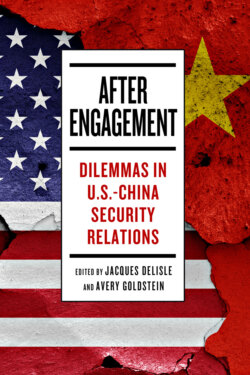Читать книгу After Engagement - Группа авторов - Страница 8
На сайте Литреса книга снята с продажи.
A Shift Delayed
ОглавлениеWhen George W. Bush took office in 2001, observers had expected US policy to move toward treating China as a strategic competitor or rival. The incoming administration’s National Security Adviser Condoleezza Rice and Secretary of Defense Donald Rumsfeld had put forth plans to transform bilateral ties and to confront challenges they saw from a rising China. Instead, intervening events delayed reconsideration of the relationship for nearly a decade and contributed to the survival of the policy of engagement until the 2010s.
The April 1, 2001, EP-3 incident prompted the new administration to reconsider the implications of a more confrontational approach toward China. More important, the September 11, 2001, terrorist attacks on the United States decisively redirected the Bush administration’s strategic focus to what it dubbed an urgent “global war on terrorism.” Protracted major military operations in Afghanistan and Iraq, as well as efforts to deal with threats Washington saw elsewhere in the Middle East, North Africa, and South and Southeast Asia, diverted attention and resources from addressing the strategic implications of China’s rise. The PRC’s support for the Bush administration’s counterterrorism agenda and China’s cooperation with the US and other G20 states to prevent a global economic disaster during the great recession of 2007–2008 pushed Washington to sustain a cooperative working relationship with Beijing.
The advent of the Obama administration further postponed reorientation of the US’s China policy. The Obama team initially sought to preserve the fundamentals of long-standing approaches to China. The administration declared that the US would “continue to pursue a positive, constructive, and comprehensive relationship with China” and “encourage [China] to become a partner for greater international security.”19 Well into Obama’s presidency, the US and China pursued cooperation and achieved noteworthy agreements on major issues such as climate change and China’s state-sponsored economic cyberspying.
But, partway into Obama’s first term, the winding down of US large-scale military operations in Iraq and Afghanistan and the diminishing perils of the global economic crisis reduced the imperatives that had delayed a reassessment of the US-China relationship. Long-developing changes in China—and their consequences for US interests—became more salient to policymakers. Both Washington and Beijing began to reassess their ties.
Worries about the challenges a wealthier and more powerful China posed to US interests prompted the Obama administration to announce a “strategic rebalance” or “pivot” that entailed a reallocation of military resources to Pacific Asia.20 Beijing reacted sharply, characterizing Washington’s renewed attention to maritime Asia as an attempt to check China’s rise.21
As China increased efforts to strengthen its control in the region and assert territorial and maritime claims, the US pushed back. Washington reiterated commitments under its mutual security treaties with Asian allies and signaled support for the Philippines’ international arbitration proceedings against China over maritime rights in the South China Sea. The US also stepped up and spotlighted naval maneuvers, asserting freedom of navigation rights in waters claimed by China, and called on China to cease island-building activities in the area and to adhere to promises not to militarize the landforms under its control. For its part, China flatly rejected the arbitration proceedings and the tribunal’s strikingly adverse decision and criticized what Beijing saw as Washington’s overreach and meddling in a region where the United States had no territorial claims. China also continued its build-up of, and on, the contested rocks and islands.22 When Washington and Seoul announced plans to deploy an antimissile defense system in South Korea to protect against a growing North Korean threat, China characterized the move as potentially jeopardizing its own security and imposed punishing economic retribution on South Korea.23
US-China economic relations were becoming more contentious, as well, and more entwined with security concerns. The Obama administration pushed for agreement on the Trans-Pacific Partnership (TPP)—a massive, multilateral trade-plus agreement that would strengthen economic ties among the US, its allies, and others in the region while excluding China, at least in the short run. The US saw the TPP as a framework that would offset China’s expanding regional influence, which was poised to grow further as Beijing promoted the Regional Comprehensive Economic Partnership (RCEP)—an agreement that would not include the US and that lacked the scope and depth of integration of the TPP.
The TPP was essentially the economic complement to the “pivot” or “rebalance” in US regional security policy. In pointed contrast to the Clinton administration’s effort to frame China’s WTO accession for American audiences as a means to change China and assimilate it into the US-led liberal order, the Obama administration presented the TPP as a contest between the United States and China over who would write the rules of the world economy for the twenty-first century.24 The Obama administration tightened reviews of Chinese investment in sensitive sectors of the American economy by the Committee on Foreign Investment in the United States (CFIUS) and, while also pursuing diplomatic solutions, responded to cyberattacks and cyberespionage against US businesses by indicting alleged Chinese state and state-sponsored perpetrators.
China also contributed to the negative turn in economic relations. Beijing criticized the TPP as an “anyone but China” pact that sought to isolate the PRC.25 China pushed forward with its preferred initiatives, including the Regional Comprehensive Economic Partnership (RCEP), the BRICS Bank (later renamed the New Development Bank), the Asian Infrastructure Investment Bank (which Washington viewed as a potential rival to existing multilateral development banks and which the Obama administration sought, unsuccessfully, to discourage US allies and partners from joining), and the Belt and Road Initiative (BRI—a potentially massive effort to promote infrastructure development and connectivity in the Asian region and beyond).26
